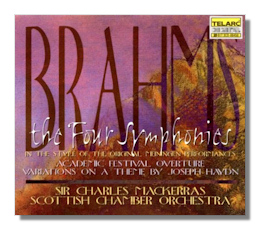
The Internet's Premier Classical Music Source
Related Links
- Brahms Reviews
- Latest Reviews
- More Reviews
-
By Composer
-
Collections
DVD & Blu-ray
Books
Concert Reviews
Articles/Interviews
Software
Audio
Search Amazon
Recommended Links
Site News
 CD Review
CD Review
Johannes Brahms

The Symphonies
- Symphony #1 (with alternate second movement) in C minor, Op. 68
- Symphony #2 in D Major, Op. 73
- Symphony #3 in F Major, Op. 90
- Symphony #4 in E minor, Op. 98
- Overture "Tragic" in D minor, Op. 81
- Variations on a Theme by Haydn "St. Anthony Chorale" in B Flat Major, Op. 56a
Scottish Chamber Orchestra/Charles Mackerras
Telarc CD-80450
This is a very interesting set. Charles Mackerras did some extensive research during his long and entirely successful career, and his Brahms recordings, while not without controversy, certainly demonstrate a musical genius at work. On these three discs, the conductor attempts to create the sound that Brahms himself would have heard during his lifetime, especially in regards to ensemble size. Yes, the period instrument movement is frankly tiresome, but here are modern instruments in a reduced ensemble to create an undeniably unique sound, certainly in this music.
In the main, each of the four symphonies has a tremendous amount of clarity. In the wrong hands, all four of these works can turn to foggy sludge. Even Klemperer's classic set isn't entirely free of a heaviness that is appropriate, but also not entirely welcome. Great Brahms conductors like Levine and even Solti have proven that this doesn't require reduced forces, but there's more at work here. The smaller ensemble allows Brahms' writing to be so much more transparent and each of the orchestral voices to be so naturally heard, that you'll fall in love with these pieces all over again. There's also no lack of impact or weight in either the First or Fourth Symphonies, darker works as a whole than the other two. In all four symphonies, Mackerras shows a seriousness of purpose and respect for a truly idiomatic sound, that you never feel like the project is a gimmick.
The same goes for the two smaller pieces, both swifter and more interesting than usual. The "Haydn" Variations too often turn into a clunky, plodding mess. No worries here, this is a freshly flowing view. As for the Academic Festival Overture, I don't know anyone who really loves the piece, but it's well done all the same. Throughout, the Scottish Chamber Orchestra plays wonderfully, and the sonic quality is top notch. I don't think this should be your only Brahms cycle, and maybe it shouldn't even be your first one. But if you think that all Brahms is created equal, give this a try. It's something special.
Copyright © 2013, Brian Wigman




















